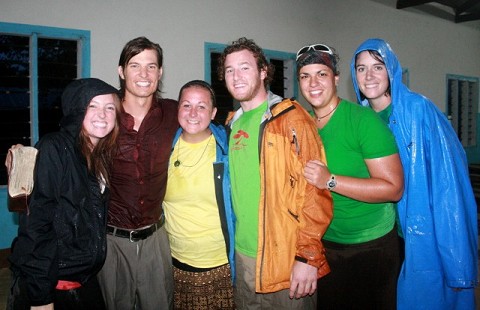June 24, 2010.
Only a few days left in Mpeketoni and things are good. There is one small problem though. We have to pay for our food and our stay
here, and the only ATM in town is broken.
Luckily there is another bank on Lamu, an island that’s only about an
hour and a half away…by car…on a good day.
Normally Kathryn, being in charge of our finances would have gone, but
she wasn’t feeling good. I had gotten up
early to say goodbye to Bill’s team which had left early that morning, so I
volunteered to go. I didn’t have much
else to do that day and if I went, someone else wouldn’t have to. If nothing else, it was a good excuse to see
the island.
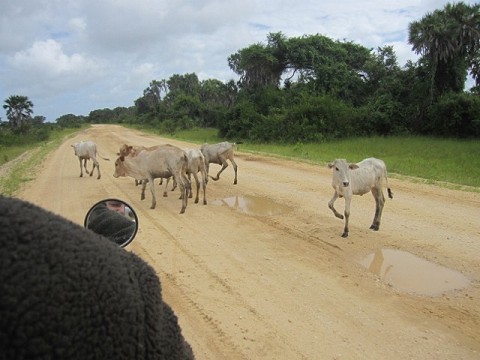 I ate breakfast and around 9:30 the Bishop and I hopped on a motorbike and
I ate breakfast and around 9:30 the Bishop and I hopped on a motorbike and
headed off. We made a couple small
pit-stops, first to pick up a helmet, then to fill up on gas, and finally to
top up the air in the tires, and then we were on our way. It had rained most of the morning so this
meant the roads would be more difficult to navigate and slow us down. It also meant that my legs, from the shin
down, would get a nice, fresh, spa-worthy mud treatment. Most of the roads in Africa are dirt, but
they are made from a special kind of dirt that compacts tightly and, when wet,
compacts further. This prevents them
from flooding (as often) or from turning into (completely impassible) mud, but
the alternative is large craters that make potholes in America look like a
standard golf divot (depending on the golfer).
The way to navigate these is to weave back and forth between them, and
when unavoidable, go through them as slowly as possible. Not exactly the fastest route.
But we weren’t in a hurry. The bishop
and I passed the time via a number of different conversations including Kenyan
wildlife, Kenyan culture, Kenyan politics, and religion in Kenya, and how each
compares to the equivalent in America.
This is fine conversation and would have sufficed to entertain for at
least most of the ride – or at least filled the socially required “conversation”
aspect of our road trip. But there was
more.
The bishop lives a simple life in many 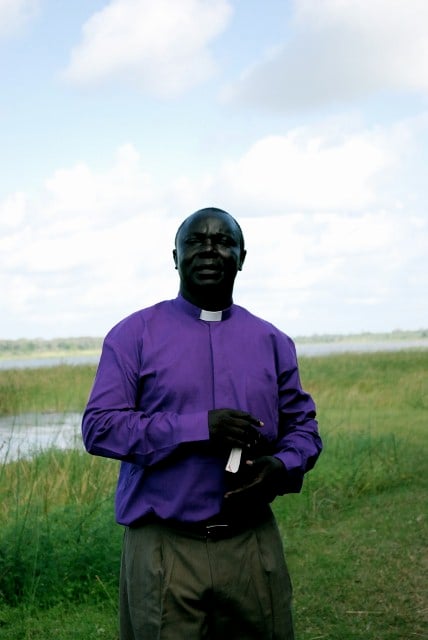 ways, but that does not mean he is
ways, but that does not mean he is
without a storied past. To say that his
journey has been interesting doesn’t do it justice. He told me stories of his village in western
Kenya where he comes from and where some of his family still live. He told me stories of his early years of
ministry, of finding his calling, and how God has guided him each step of the
way. He told me one story of being
stranded near dark in the middle of nowhere with a broken motorbike chain, only
to be rescued by a construction worker looking for a man left at the job
site. The construction worker was the
bishop’s uncle and the missing man was home safe and sound all along. He told another story of sleeping with a
cobra curled up next to him, and another of a nearly deadly encounter with the
biggest lion he had ever seen. In each
instance, among his many travels, God had always protected him and kept him
safe from harm.
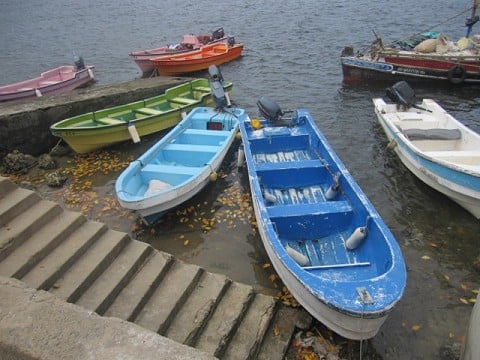 Our journey came to an end some two hours after we left when the road came to
Our journey came to an end some two hours after we left when the road came to
an end, and we were forced to board a small speed boat and cross to the
island. We got to the island, stopped at the bank to get the money, grabbed a quick drink and a bathroom break, and we were on our way back. I didn’t see much of Lamu, some buildings, an alleyway, a “bathroom” that was kind of like a closet with a urinal and a hole in the ground, a couple donkeys (the only mode of transportation on the island), and people (the island is 100% Muslim, and I saw more white people in the 15 minutes we were there than in the entire previous 3 weeks combined).
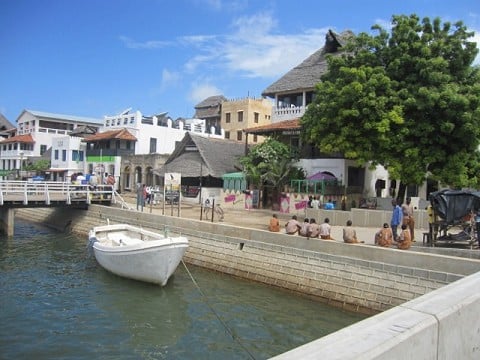
Overall, our ride home from Lamu was pretty uneventful. Some mixed conversation here and there, a pothole or two, though the road had dried considerably since the morning, and a few buses that passed a bit too closely for either of our liking – but in general, a pretty leisurely ride through the coastal African bush. I remember thinking about how awesome it was to be able to put “get upper thigh sunburn from riding through African bush on a motorcycle” on my list of accomplishments. Life was good.
We were about 15-20 minutes from Mpeketoni, my lower back felt like a small yet incredibly strong child had been using it as a boxing bag for the past hour, and the bishop was pointing out a school to our left where one of the members of his congregation was a teacher. As we began rounding a curve in the road I saw a truck up ahead coming toward us on the wrong side of the road…fast. The bishop and I quickly realized that he wasn’t really sure which side of the road he wanted to be on, and someone should probably make a decision soon. Both he and the bishop made a decision, unfortunately both chose the same direction. The truck driver slammed on his brakes and so did we. Rememer that dirt I told you they use to make roads in Africa? It’s not known for it’s assistance in braking – especially after a long night of rain. So, while both the motorcycle and the truck applied their brakes early, neither was early enough. Both skidded for a long way.
As we got closer and closer we both knew we weren’t going to stop in time. The motorcycle fell on its side, the bishop and I went rolling off, and the next thing I knew I was looking up from under the front of the truck. My left shoulder was about 6 inches from where the tire stopped. I got up and looked around – I checked my body and somehow, amazingly I had no major damage – only a few small scratches on my pinky, forehead, and knee.
The bishop was not so lucky. I remember, as I was rolling 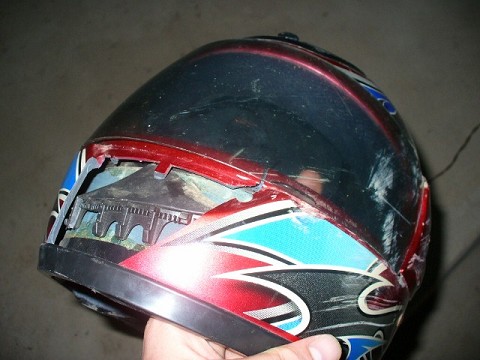 across the dirt road, hearing the sound of his helmet hitting the front of the truck. I fully expected to look down and see the helmet, possibly with his head still in it, crushed under the tire of the truck. But, when I looked up, the helmet was on the ground and he was staggering around about 5 feet from the truck. He had a few cuts on his forehead, but other than that he looked ok. And then I saw his hand. His right arm was limp at his side and blood was running steadily from a bone-deep cut at the base of his thumb. His whole hand was covered in blood and he was visibly shaken up.
across the dirt road, hearing the sound of his helmet hitting the front of the truck. I fully expected to look down and see the helmet, possibly with his head still in it, crushed under the tire of the truck. But, when I looked up, the helmet was on the ground and he was staggering around about 5 feet from the truck. He had a few cuts on his forehead, but other than that he looked ok. And then I saw his hand. His right arm was limp at his side and blood was running steadily from a bone-deep cut at the base of his thumb. His whole hand was covered in blood and he was visibly shaken up.
We got him into the truck and drove to the hospital. He was given pain medication, x-rays were taken, and his hand was stitched up. He had simple surgery in the hospital in Mpeketoni before it was determined that he should be taken to a bigger hospital in Malinidi – about 2 hours away – for more extensive surgery to repair two compound fractures in his hand. he also has a mild concussion and deep chest and shoulder bruising.
He was wearing a helmet. I wasn’t. I have a few small scratches. He is still recovering.
There are still so many things running through my head about the whole thing. When I think about it it’s more like a series of slides or pictures than a movie.
It all just kind of makes me wonder – it brings
a lot of questions in my head about when and where God chooses to intervene in
certain situations. I understand why bad
things happen in the world. The question
that comes up is how much of the bad stuff in the world is regulated or allowed
and how much does God influence or prevent all together? I think about the inches between me and that tire. I think about the amount of tread on the tires. I think about the seconds between rolling off the motorcycle too late or at just the right time. I think about exactly how much rain fell the night before. I think about the number of potholes and their placement. I think about the rocks in the road, and the ones that weren’t. I think about what would have happened if I didn’t stop for juice, or to go to the bathroom. All the
details that make the difference between walking away from a motorcycle
accident with a few scratches, or not walking away at all. How many of those details does God have his
hand in, and how much of them can we change? I don’t know. I don’t know how big God is or how deep or encompassing his plan is or isn’t. I’m glad I don’t know. It would make me paranoid or scared or passive or all of the above and that’s not living. But I am living. And the bishop is living. And now we both have a new story to tell.
